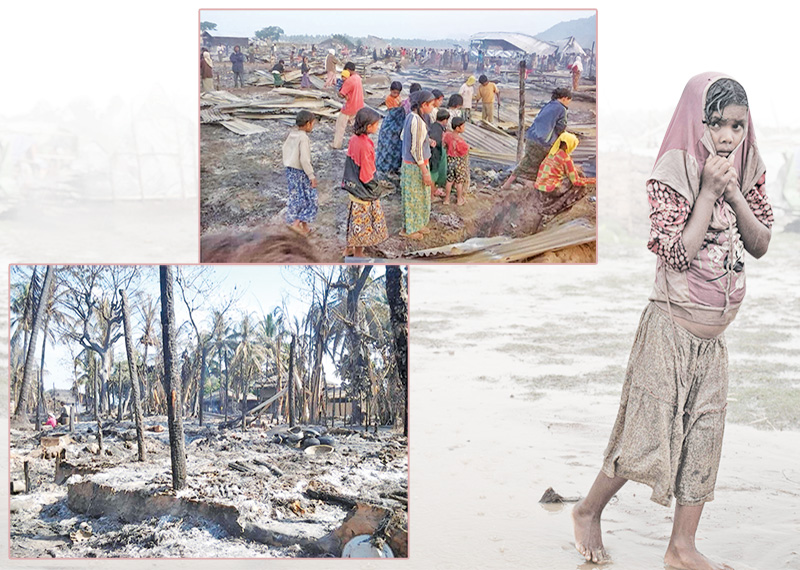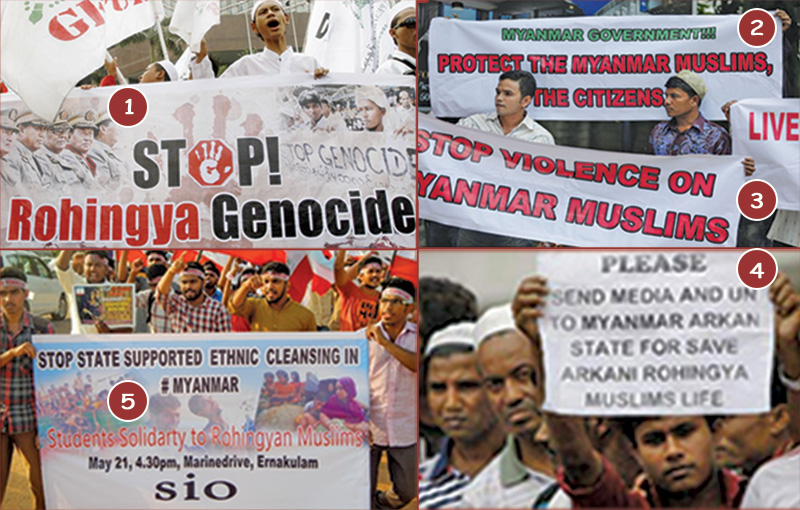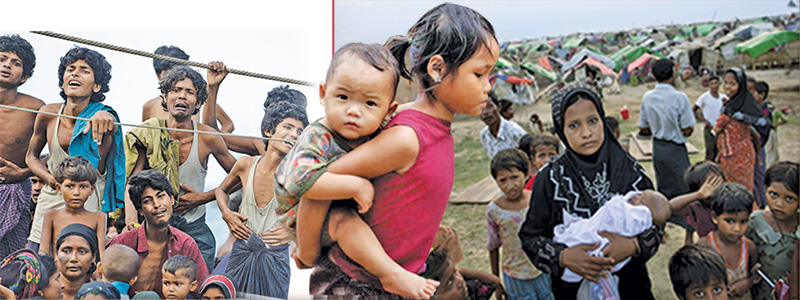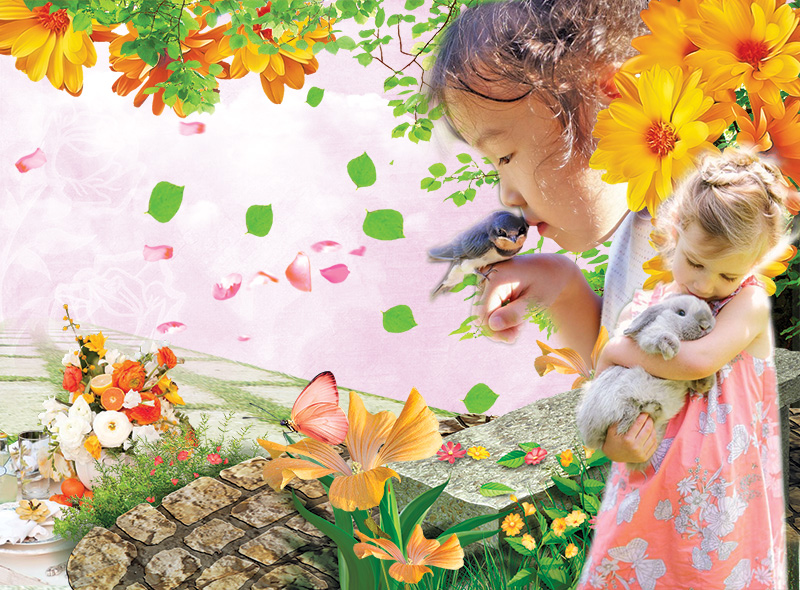Bigotry: The Dark Danger
A Helping Hand for Refugees
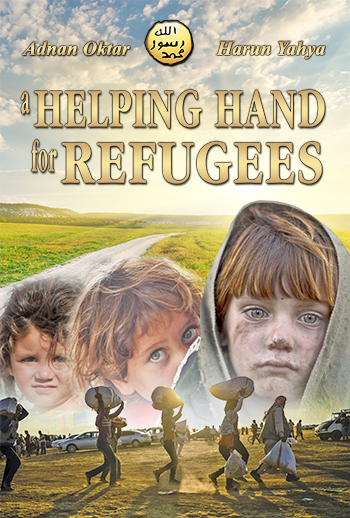
DOWNLOAD THE BOOK
CHAPTERS OF THE BOOK
- Introduction
- Supporting refugees is the behavior that will be most pleasing to God
- Adnan Oktar's remarks concerning refugees on A9 TV
- Events in Myanmar are crime against humanity
- A cry for help to the U.N. from Rohingya of Myanmar
- What if you were living in a refugee camp?
- The crime against humanity in Yarmouk must be ended as a matter of urgency!
- Behind the persecution in Myanmar
- How does it feel to be a Rohingya?
- One of the dozens of problems facing Yemen is immigration
- Refugees: Stopping the Madness
- The safety of our Syrian refugee brothers is entrusted to the hospitable Turkish people
- Buffer Zone: A Safe Haven for the Syrians
- A secure zone must be established at once on the Turkish-Syrian border
- The conundrum of Libya's refugees and migrants
- Drowning migrants is a blot on humanity
- Are the boat people a burden for Thailand?
- Deafening silence over Rohingya issue
- What can European countries do against the tide of Migration?
- The Rohingya Muslims are being exiled in their own lands
- Syrian refugees in the 4th year of the crisis
- Syria: The downward spiral of desolation
- Illegal immigrants: Only a statistic in Europe
- Syria’s human tragedy
- Yarmouk cries for help
- The world refugee problem can be solved with love
- Adnan Oktar's Remarks Concerning Refugees on A9 TV
- Europe must step up for humanity
- Nobody to wipe Rohingyas’ tears
- Asylum seekers: A problem of humanity or security?
- It is no economic loss to help Syrian refugees
- A heart for helping refugees
- When conscience fails, children suffer
- Events of global shame
- Will Europe pass the refugee test?
- Condemning refugees to death
- The European refugee crisis: Only if there were some empathy
- The priority in Libya must be to establish love and affection between the blocs: Consensus will then come naturally
- Refugees with no great expectation
- Walls cannot be a solution to security issues
- Refugees not a threat, but an important asset for Europe
- What will election victory bring to the people of Rohingya?
- Humans have rights on paper, but apparently not in real life
- EU, Turkey find silver lining
- Refugees are the victims of the Paris attacks, not its perpetrators
- Being leaderless is the reason behind the oppression Muslims suffer
- The EU is in danger of taking Turkey for granted
- Conclusion
< <
5 / total: 48
A cry for help to the U.N. from Rohingya of MyanmarHarakah Daily – 27 January 2014
Muslims constitute only three million of the population of 70 million of Myanmar, the largest country in the Indochina region in Southeast Asia. However, terrible savagery is being inflicted on Muslims. The main cause of this savagery is ethnic and religious discrimination. The 800,000 Rohingya living in the country are not considered as citizens. These people are regarded as "illegal migrants" who had come in the past from the neighboring country of Bangladesh. On the other hand, the Bangladeshi regime does not admit Rohingya people living along the coastal strip on the border into the country. Excluded by both countries, the Rohingya people are struggling to survive as "stateless persons" in the region. Since the two countries reject them, the Rohingya have no identity documents, and thus no citizenship rights. Since their presence cannot be proved, neither can their absence. They are unable to benefit from education, social rights such as health and public services, are refused admittance to hospital and cannot work in public offices. Since they have no means to attain education, illiteracy levels stand at 80%. They are unable to obtain birth certificates for their children and have no permission to marry. They cannot own land or property. They have no right to build concrete houses and can only live in ones made of timber or bamboo, and these can easily be destroyed when attacked and at times of heavy rain. It is a known fact that the Rohingya people, regarded as "illegal immigrants" in Myanmar since 1978, are subjected to a policy of oppression and persecution. These policies have been stepped up since June 2012. From that time on, 240 people have lost their lives, mainly Muslims living in the province of Rakhine, and more than 250,000 have been displaced.
Attacks against the Rohingya people have not ended. On January 14th 2014, the Myanmar Armed Forces, Police Forces (Hlun Hteins) and Rakhine terrorists carried out a savage and bloody attack on the Rohingya village of Du-Chira-Dan (Kilai-Daung). Eyewitnesses maintain that some 60 people were killed in the attacks, many innocent villagers were detained; women and girls were raped and that 200 women, six men and five children have gone missing. Human rights organizations reported that hundreds of people fled the region in terror in an attack on the village of Du Char Yar Tan, inherited by Rohingya Muslims. At present, 340 homes and a settlement area inhabited by 4,000 people have been totally evacuated. Authorities have declared the village to be a 'forbidden zone' and external observers, journalists and Rohingya people are banned from entering the village. The events are alleged to have begun with the killing of eight Rohingya by Aung Zan Ohyu, the chief of Duchiradan village. The chief wished to conceal the crime since it had been witnessed by villagers thus he tried to put them under arrest and opened fire on them. They also raped one of the girls in the village. Tensions in the village rose because of these events, and one of the police officers on the scene was killed by villagers. Officials from the Maungdaw region, attached to Rakhine Province, ordered the security forces to open fire on the villagers. Eyewitnesses say that the officials subsequently tried to hide the bodies of the dead villagers. A report from January 22nd says that the Naypyidaw regime issued an "arrest warrant" for all male Rohingya over the age of 10. Concerns that this foreshadows a new wave of genocide against innocent people are growing.
However, this is not the first report of massacres of Rohingya. There are witness accounts of Rohingya being taken prisoner and used in human trafficking, being tortured to death in various ways, of bodies being taken out into the jungle in lorries and being cut into pieces and buried in pits, of women being raped and having their breasts cut off before they are killed. The people of Rohingya are in a state of fear yet there is nothing they can do to protect themselves. They have no organization to shelter them and no citizenship or legal rights. They lack the slightest technological means by which to make their voices heard to the world. The Myanmar government, on the other hand, denied all these reports when U.N. Human Rights Special rapporteur Tomas Ojea Quintana asked for an investigation into them, and said that no Rohingya people have died, apart from a police officer. Hla Maung Tin, Prime Minister of the Province of Rakhine, instead accused the world media of waging a "smear campaign." Of course, we must not forget here that since the Rohingya are not regarded as citizens, they have no identity documents; therefore, if they die or disappear there are no official records to prove their existence or otherwise. So if the allegations are true, witness statements and the presence of corpses are the main evidence that can confirm the incidents. It is reported, however, that officials have covered up the evidence of the slaughter as quickly as possible, for which reason the world is unaware of that evidence of the massacres.
Yes, the Muslim Rohingya people are in dire straits. The United Nations needs to go into action and the necessary steps need to be taken to guarantee all the rights to life of the Rohingya people if they are to be saved. If the events in the Maungdaw region are to be prevented from growing and if the truth of the slaughters is to be determined, it is a matter of the gravest urgency for an international investigation team to go in and conduct inquiries in the country before the evidence is all destroyed. After that, permanent measures need to be taken so the people removed from the embargoed village can return to their homes and a safe environment can be provided for them. The main steps needing to be taken are putting a halt to the torture, rapes, looting, illegal arrests and killings, investigations to be conducted into those involved in such illegal practices and the appropriate legal measures to be taken, and for the international media to be given the opportunity to examine the scene of the events. After that, it is vitally important for a U.N. Peace Force to be sent to the Rakhine region in order to guarantee the safety of the Rohingya people. The most important step after that is for the U.N. to take the requisite steps for the granting of citizenship rights to the Rohingya people and for the protection of those rights. Contacts need to be established with the Myanmar government so that they can benefit from public rights such as education, health, drugs and treatment like all other citizens of the country and so they can enjoy all human rights. Every person of good conscience of course has a responsibility to take the requisite steps for the protection of this innocent and defenseless people trapped between Myanmar and Bangladesh. There is no doubt that it is also of the greatest importance for the U.N., which has assumed the mission of protecting peace, security and basic human rights and freedoms to lead the way on this matter without further delay. This article was published in Harakah Daily: Related Links: http://burmatimes.net/a-cry-for-help-to-the-u-n-from-rohingya-of-myanmar/ Link of Article in English: Link of Article in Turkish:
|
5 / total 48
You can read Harun Yahya's book A Helping Hand for Refugees online, share it on social networks such as Facebook and Twitter, download it to your computer, use it in your homework and theses, and publish, copy or reproduce it on your own web sites or blogs without paying any copyright fee, so long as you acknowledge this site as the reference.

